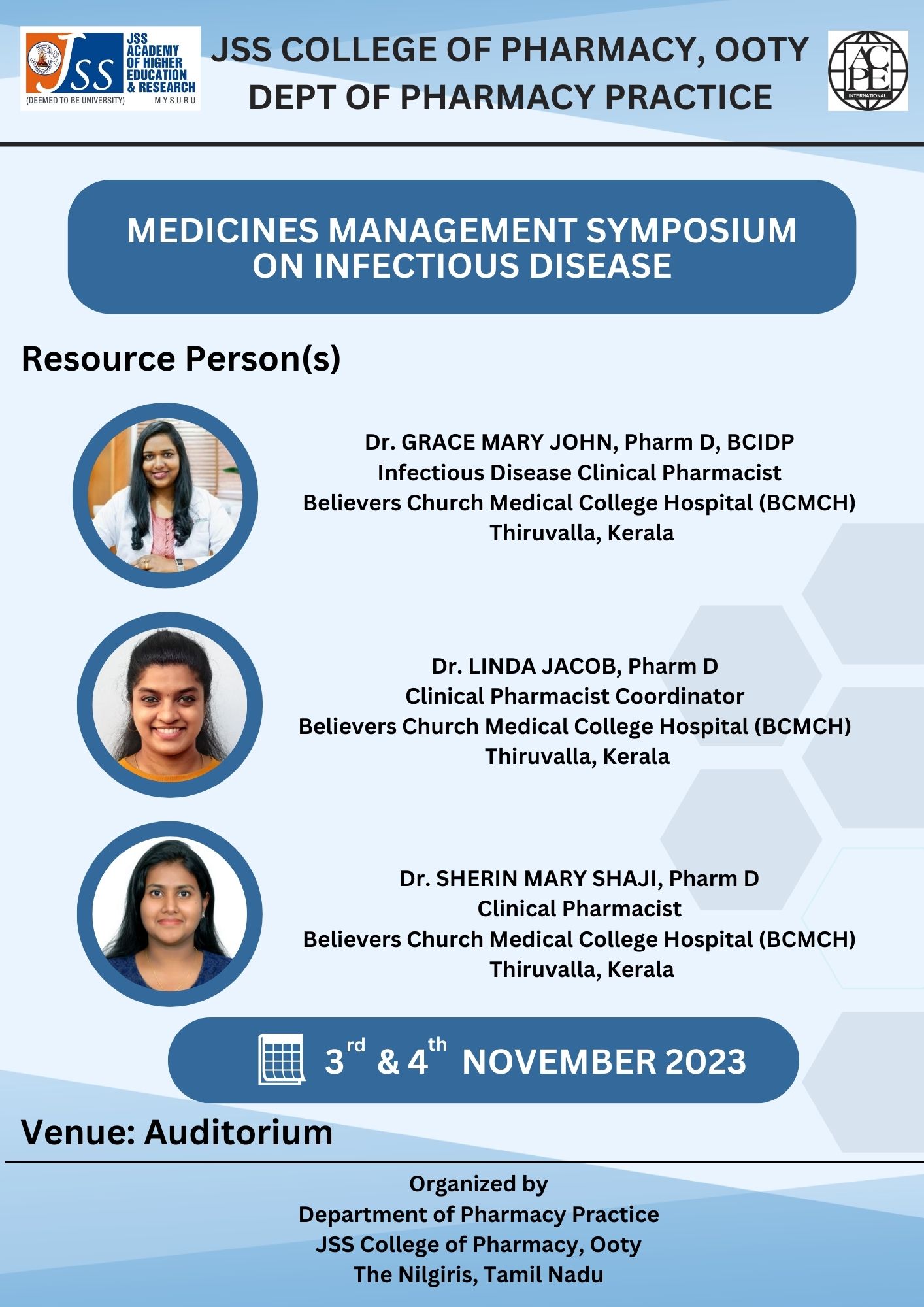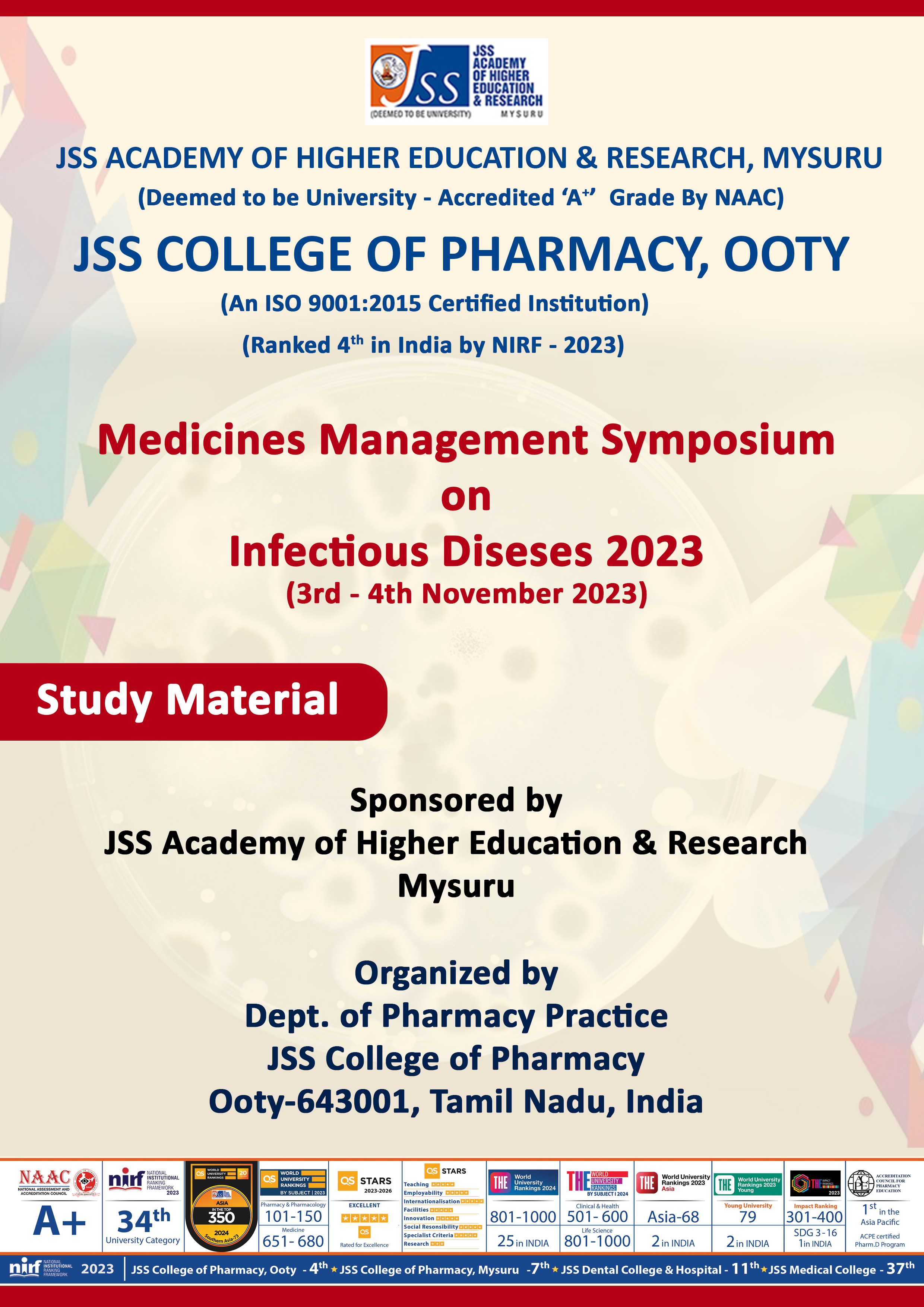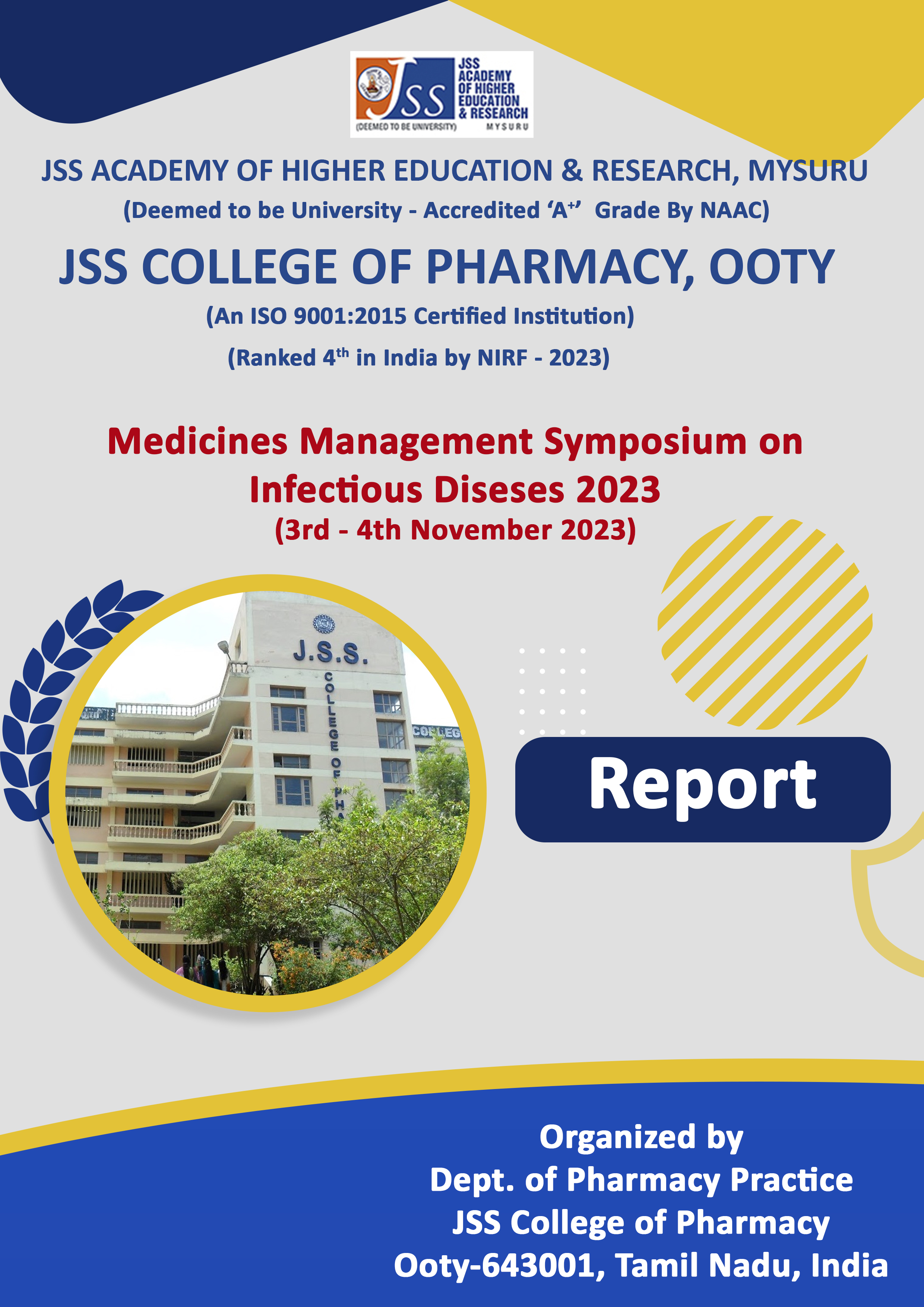Best Practice & Innovation
Hospital Formulary
Hospital formulary is a list of pharmaceutical agents with its important information which reflects the current clinical views of the medical staff. The development of hospital formularies is based on evaluations of efficacy, safety, and cost-effectiveness of drugs.
Department of Pharmacy Practice has implemented our own ‘Hospital Formulary’. The purpose of this formulary is to help the medical, paramedical professionals and clinical pharmacy students in the Government hospital.
It provides up-to-date information from the essential drug list 2015-16 by Tamilnadu Medical Services Corporation (TNMSC) about the prescribing and administration of drugs available in the hospital. In our Formulary, drugs were classified based on their therapeutic category.
The hospital formulary book contain two section
Section-1
- List of drugs used in the formulary
- Basic information on each drug
- Efficacy for the treatment of specific conditions
- Safety profile of the item
- Interaction profile
- Adverse effects
- Pharmacokinetic profile
- Availability of the item
- Available dosage form
- Labeling information
- Patient Counselling
Section-2
- Measurement, Conversion and equivalent
- Insulin calculation
- Drugs that cause discoloration of urine
- Drugs that cause agranulocytosis
- Children’s dose
- Renal adjustments
- Metric units
Continuing Professional Education
A pharmacist is the professional who is in direct access to the public and patients. He dispenses medication with prescription and in certain cases without prescription as over-the-counter products. The professional responsibility of a community pharmacist does not end up with mere dispensing the drugs to the needy people, but also include other services like patient counseling, domiciliary service, health education campaigns, health screening, immunization camps etc. Unfortunately the role of pharmacists is not so much recognized till today especially in India and needs strong efforts to enable our community pharmacists to play wide range of professional roles in their practice set-up on par with the developed world.
With this background, Continuing Pharmacy Education (CPE) program for practicing is being organized by Dept. of Pharmacy Practice, JSS College of Pharmacy, Ooty – to educate and motivate about the various roles of pharmacists in the Nilgiris.
Objectives of CPE:
- To explain and understand the various roles of pharmacists in pharmaceutical care
- To upgrade the quality of professional practice of community / hospital pharmacists
Course Content
A pharmacy practitioner can assist the society when the clinical orientation of the pharmacy training program is understood better. During the one day CPE the following interactive discussions are scheduled as provided below:
- Pharmaceutical Care
- Communication Skills
- Rational Drug Use management
- Essential drug concept
- Health Screening Services
- 7 Star Pharmacist
- Storage and stability of Pharmaceutical products
- Patient counseling
- ADR monitoring and reporting
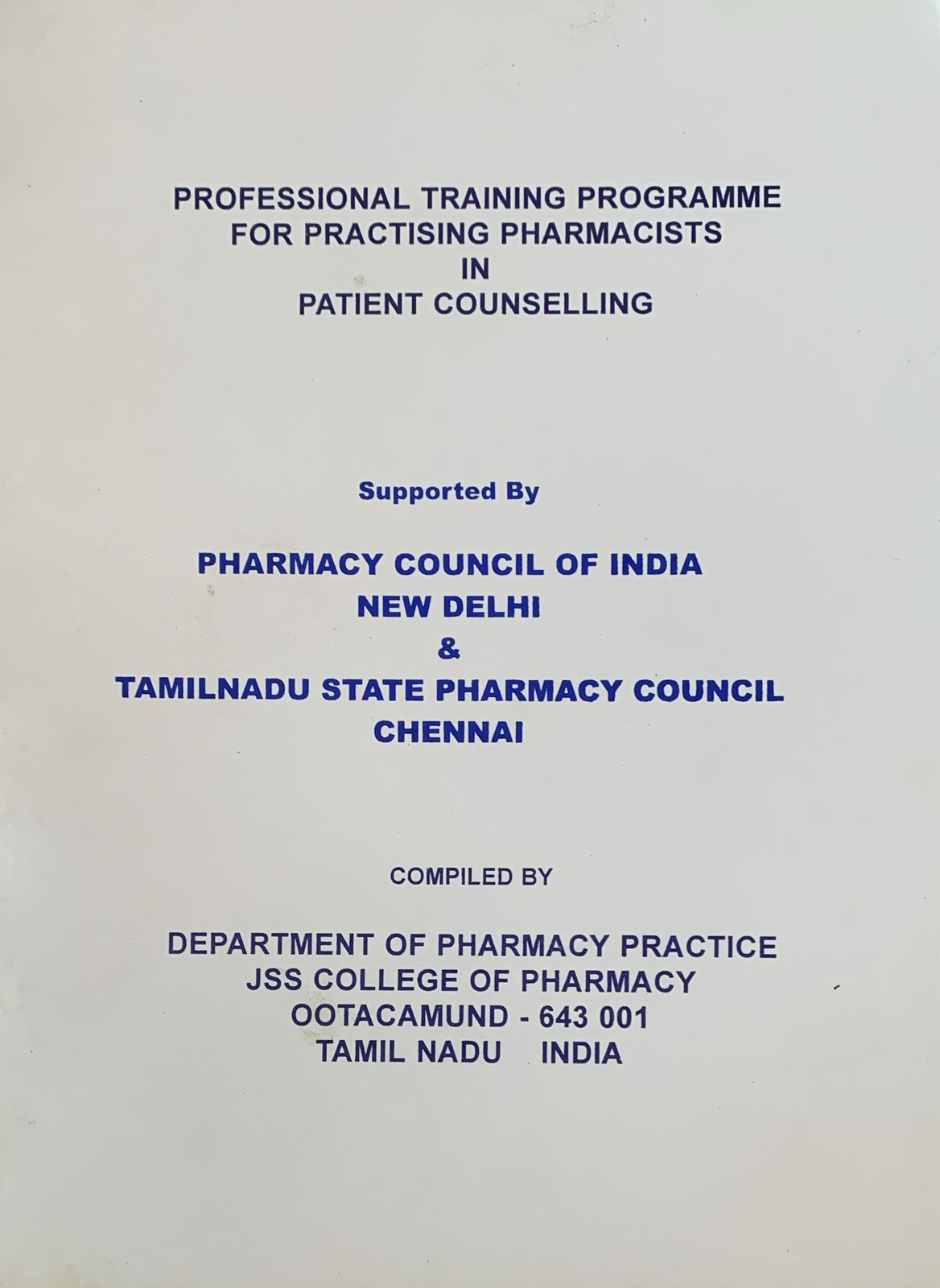
Drug Interaction guide
A drug interaction is a situation in which effect of one drug is altered due to co-administration of another drug/food.
The pharmaceutical interactions that are of special interest to the practice of medicine is compiled as per the Tamilnadu Medical Services Corporation (TNMSC) list of medicines for easy reference and understanding the outcome of the interaction.
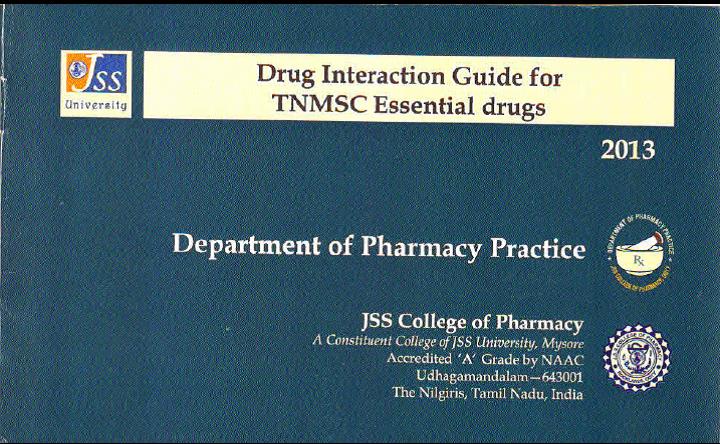
Poison Protocol
In our homes, a wide variety of chemical preparations are used for various daily requirements. Eg: pesticides, mosquito repellents, acids, etc., If these chemicals are misused, they are associated with great health risks. The probability of ingestion of these substances/products either accidentally or intentionally has increased worldwide.
Acute poisoning is one of the commonest emergencies throughout the world. To ensure patient safety, a framework for prevention and management of these situations has been developed by the Department of Pharmacy Practice. As a part of this programme, 'Poison Protocols' have been developed and given to the Healthcare team of GHQH, Ooty in-order to treat the Emergency Poisoning cases.
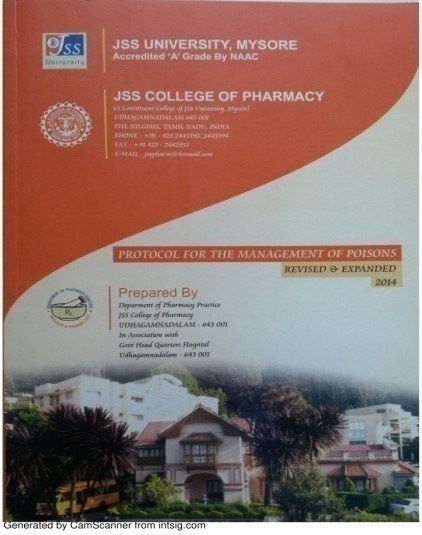
Objective Structured Clinical Examination (OSCE)
The Objective Structured Clinical Examination (OSCE) is a versatile multipurpose formative evaluative tool that can be utilized to assess IPPE students in a clinical setting. OSCE assesses competency based on objective testing through direct observation. It is precise, objective, and reproducible allowing uniform testing of students for a wide range of clinical skills. Unlike the traditional clinical exam, the OSCE could evaluate areas most critical skills such as communication skills and ability to handle unpredictable patient behavior. Skills Assessed in OSCEs
- Formulation of a working diagnosis
- Data and image interpretation
- Requesting and interpreting investigations
- Communication skills
- Decision taking
- Handling of complex management issues
- Counselling
- Breaking bad news and practical management of emergency situations
- Management problems
- Administrative skills
- Handling unpredictable patient behavior
- Data interpretation etc.,
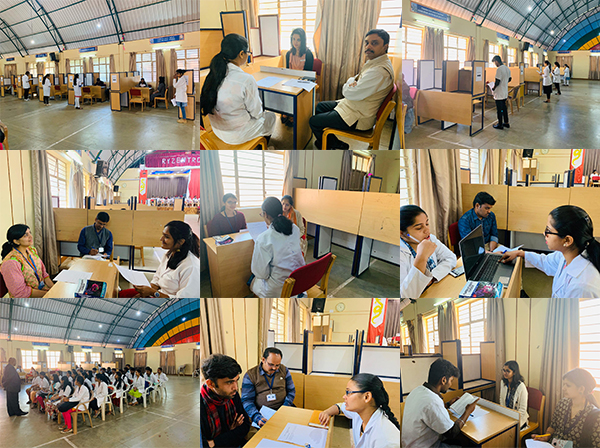
Every fifth year Pharm D student should undergo three OSCEs i.e. one Model OSCE and Two sessional OSCEs in which six stations will be arranged for the assessing the knowledge and skills of the student.
Stations List
- Health Screening
- Drug Information service
- Dosage Calculation
- Adverse Drug Reporting
- Treatment Chart Review
- Patient Counselling
Modular teaching
Considering the individual differences among the learners which necessitates the planning for adoption of the most appropriate teaching techniques in order to help the individual to grow and develop at his/her own pace, it is proposed to introduce ‘Modular Teaching’ in the various programs offered at JSS AHER. As a prototype, it is first introduced with V Pharm.D. students for 3 subjects at JSS College of Pharmacy, Ooty.
Modular teaching is one of the most widely recognized teaching learning techniques in many countries including few Asian regions. Modular approach is used almost in all subjects like, science, medical education, social sciences and even in computer education. As per this scheme, the lecture topics of one particular subject for one Sessional examination are considered as an independent module and in a specified time period those lectures are delivered as module. The formative assessment is also done during this period, obviously at the end of the module. This shall enable the students to have a focused understanding on a particular subject matter and it avoids the burden of multiple tasking. Further, this also helps the faculty members to productively use their time apart from regular teaching schedules viz. research and administration.
Simulation lab
Simulation is a technique for practice and learning that can be applied to many different disciplines and trainees. It is a technique to replace and amplify real experiences with guided ones, often "immersive" in nature, that evoke or replicate substantial aspects of the real world in a fully interactive fashion. Simulation-based learning can be the way to develop health professionals’ knowledge, skills, and attitudes, whilst protecting patients from unnecessary risks.
Simulation activities comprise the simulation experience, debriefing, and evaluation which offer an avenue to assess clinical judgment and critical thinking without threatening patient safety. On this context, College of Pharmacy, Ooty and Mysuru have introduced simulation practice for IPPE students to have hands-on and understand the core concepts of clinical pharmacy activities and their significance.
Each simulated experience has specific objectives that are given to the student prior to engaging in the simulation experience and both the colleges were applying well founded simulation approaches to help student in clinical rotations to attain education goals.
Simulation activities conducted for II, III, and IV PharmD students as a part of their IPPE-Introductory Pharmacy Practice Experience. In total, eight simulation activities were conducted in College of Pharmacy, Ooty.
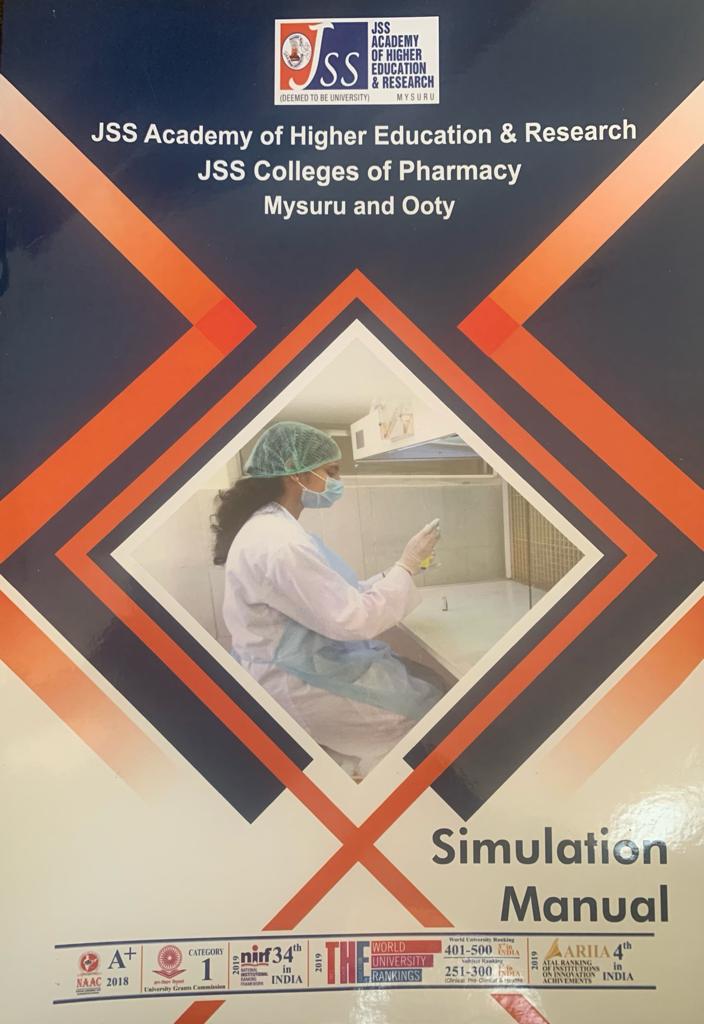
List of Simulation Activities:
- BP monitoring
- Blood Glucose monitoring
- Patient Counselling
- Medication History Interview
- Treatment Chart Review
- Drug Dispensing
- IV Admixtures
- Medication Reconciliation
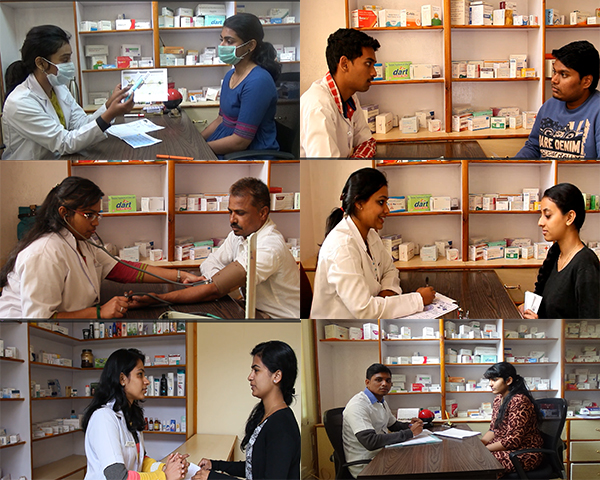
All the simulation activities were recorded using an IP Camera or Camcorder and the recorded videos were stored in a specific computer through IP access. Debriefing sessions were conducted immediately after the simulation is completed and the progress of simulation activities were monitored and evaluated by the preceptors and its documented using various simulation activity related evaluation forms.
All the II, III, IV PharmD students perform each simulation activities three times in a year during their therapeutic practical hours, accordingly the simulation activity roasters were prepared by the program manager. Simulation activity related feedbacks were collected from IPPE students to improve the process and quality of the program.
In total we have three simulation labs which supports for all our simulation activities.
List of Simulation Labs:
- Medication Dispensing Unit - Model
- An Admixture Lab
- Patient Counselling Room
Physical Facilities:
- All the simulation lab activities are recorded using IP Camera or Camcorder.
- Patients Counselling Visual Aids /Pamphlets
- IV Admixture Set
- Digital Sphygmomanometers
- Glucose Monitoring Kits – Accu-Check
- Reference Books / Micromedex / Poison index
In general, we prefer role play method for conducting simulation activity and we may add high fidelity simulators based on its necessity in future. We introduced simulation activity manual for the students to understand the objectives of each simulation activity and its related expected outcomes.
Centre for Research Methodology & Biostatistics
With the vision to establish "Centre for Research Methodology & Biostatistics" department has been involved in organizing workshops from 2015 on Research Methodology and Biostatistics [RMBio] within JSS College of Pharmacy Ooty and also, outside the institution.
Resource Persons
- Dr S. Ponnusankar M.Pharm PhD, Program Coordinator
- Mr C Jayakumar MCA, B.Ed, M.Phil, Assistant Professor
- Mr H N Vishwas M.Pharm, (Ph.D) Lecturer
- Report on Workshop on Research Methodology and Biostatistics, April 7-10, 2015, at JSS College of Pharmacy, Ootacamund, Tamilnadu
- Report on Workshop on Research Methodology and Biostatistics, November 17 & 18, 2016 at College of Pharmaceutical Sciences, Medical College, Calicut, Kerala
- Report on Workshop on Research Methodology and Biostatistics, January 10 - 12, 2017 at JDT Islam College of Pharmacy, Calicut, Kerala
- Report on Workshop on Research Methodology and Biostatistics, March 22 - 24, 2017 at JSS College of Pharmacy, Ootacamund, Tamilnadu
- Report on Project Work Orientation & Workshop on Research Methodology and Biostatistics, June 27 -30, 2017 at JSS College of Pharmacy, Ootacamund, Tamilnadu
The reports of the workshops held on RMBio are as follows
With continuous efforts in the right direction, Department of Pharmacy Practice will emerge shortly as a Centre of Excellence in RMBio.
Coursework on Scientific Writing
The main objective of the course is to teach VI Year Pharm D (intern), M Pharm (Pharmacy Practice) students and research scholars of the department to improve their writing style and manage the publication process, with particular focus on writing for pharmacy practice and medical journals. The course will give the participant insights, motivation and practical training, and they will work on their own review paper.
A 14 days’ Workshop on Scientific Writing was organized between 21 July - 04 August 2017 at Department of Pharmacy Practice, JSS College of Pharmacy, Ooty.
Learning outcome
By the end of the course, participants were well trained on ways to draft and review a scientific paper. Also, the participants learned clearly about the scientific paper review and publication process.
E-Lingua guide
Wide student diversity exists in the Department of Pharmacy Practice. Students from various parts of India and abroad are studying in the Department. In order to assist these students, a language guide has been developed in Tamil (E-Lingua Guide).
E-Lingua guide is in audio format. It contains common medical terminologies, basic communication aspects and information pertaining to common patient symptoms in Tamil. E-Lingua guide is acting as a critical bridge in decreasing the communication gap and ensures students with limited Tamil proficiency to interact with patients and provide clinical pharmacy services.
Centre for Patient Counseling & Education
Students of Department of Pharmacy Practice are involved in patient counselling and education. Both In-patient and Out-patient Counselling services are provided to patients visiting Government Medical College & Hospital, Ooty and other Practice sites.
In order to enhance patient understanding towards the drugs and medical devices (Eg: Inhalers, Rota-halers, Insulin injections, Glucometer handling) Pictograms for patient counselling have been developed from Department of Pharmacy Practice. Pictograms are not-only useful for the patients but also useful for the students because they provide accurate and unbiased information.
Pictograms
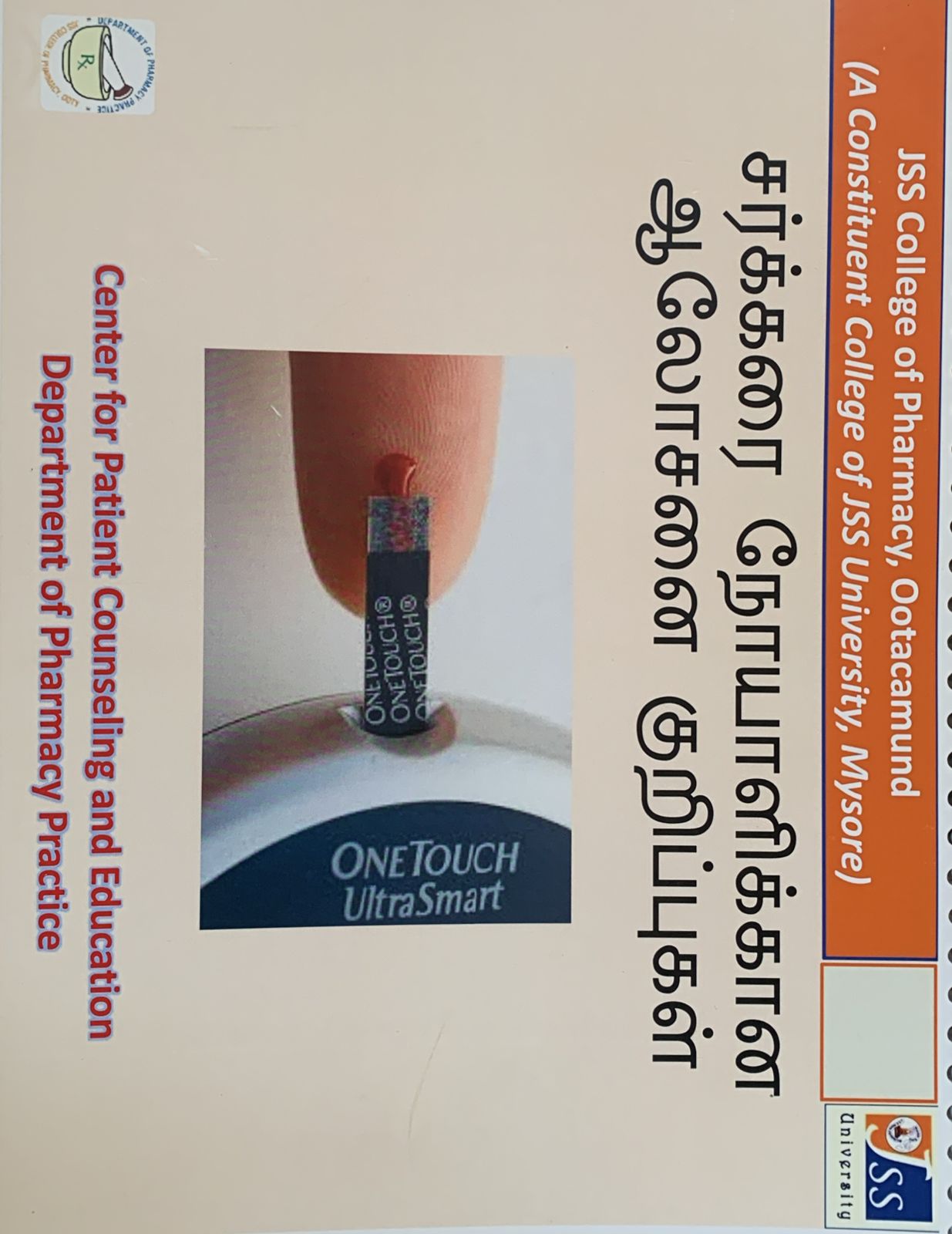
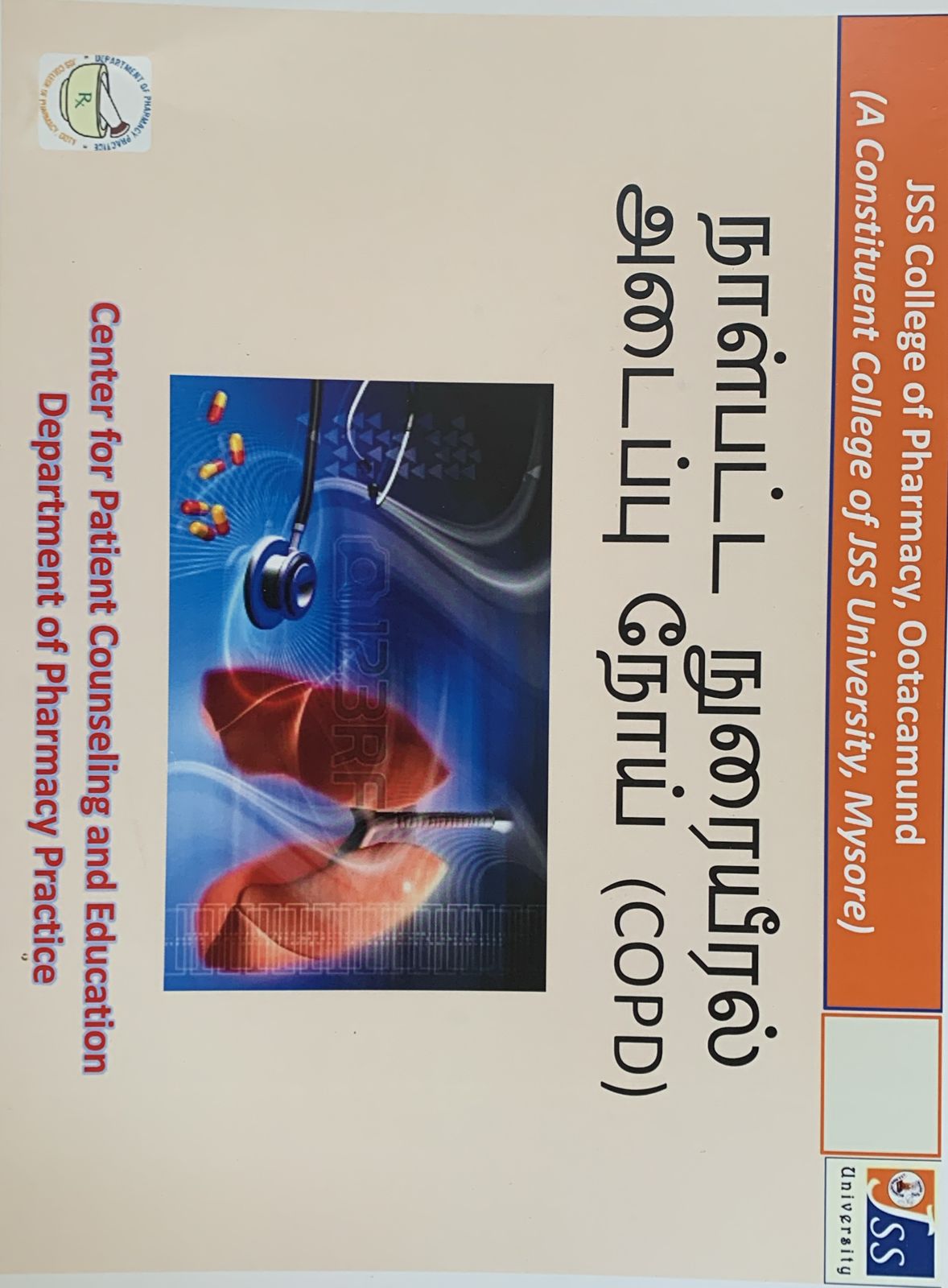
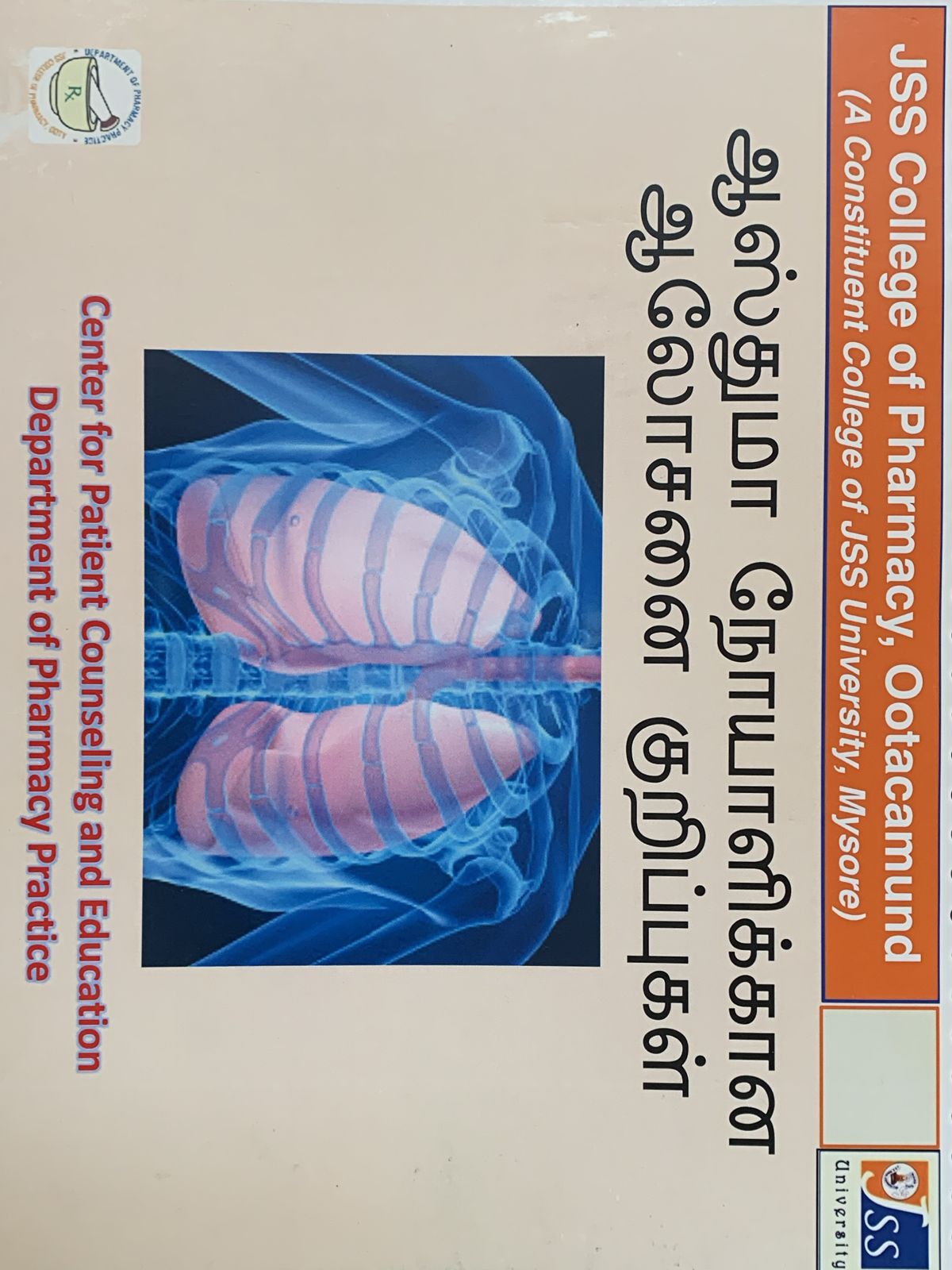
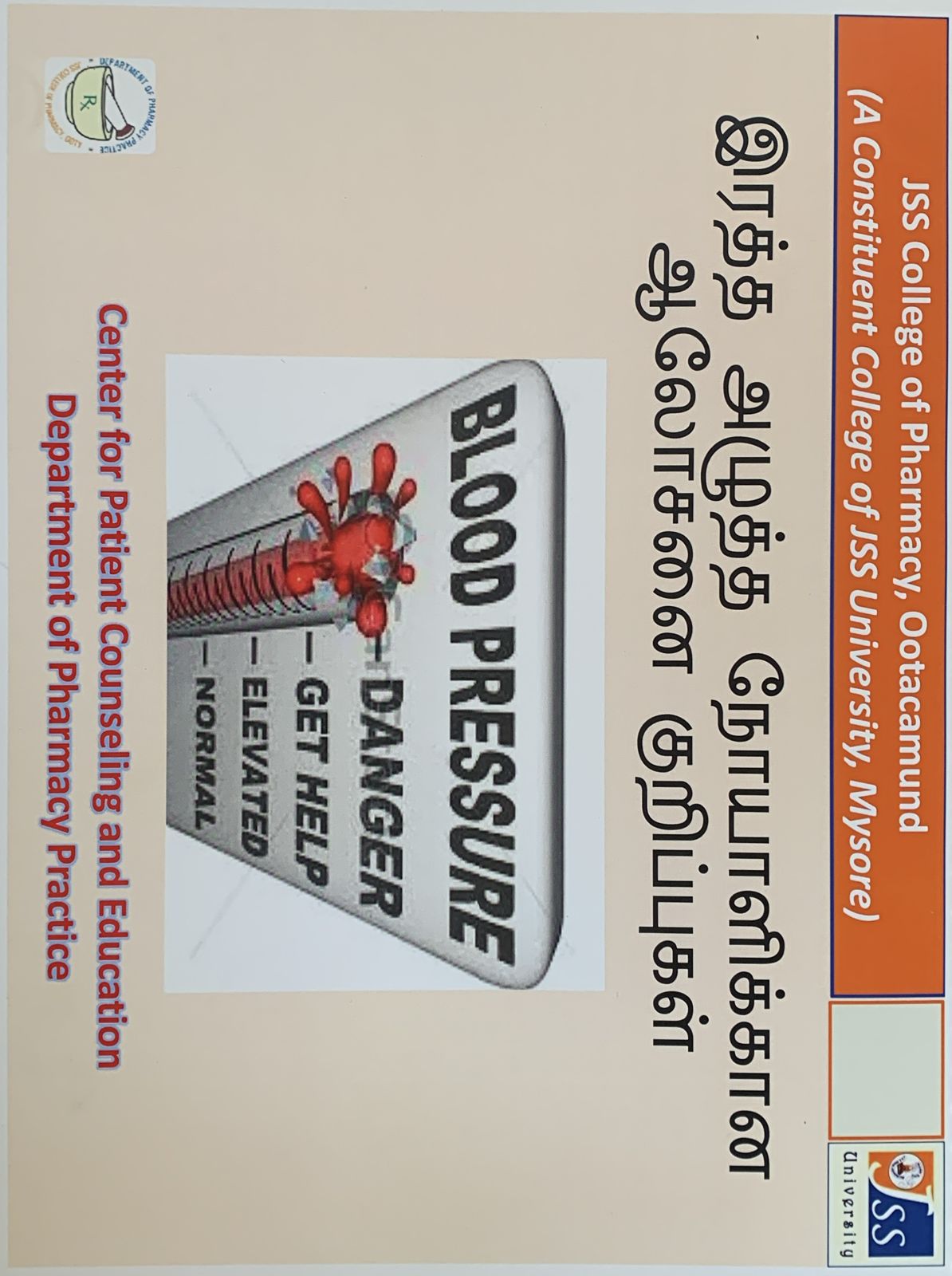
Patient Information Leaflet
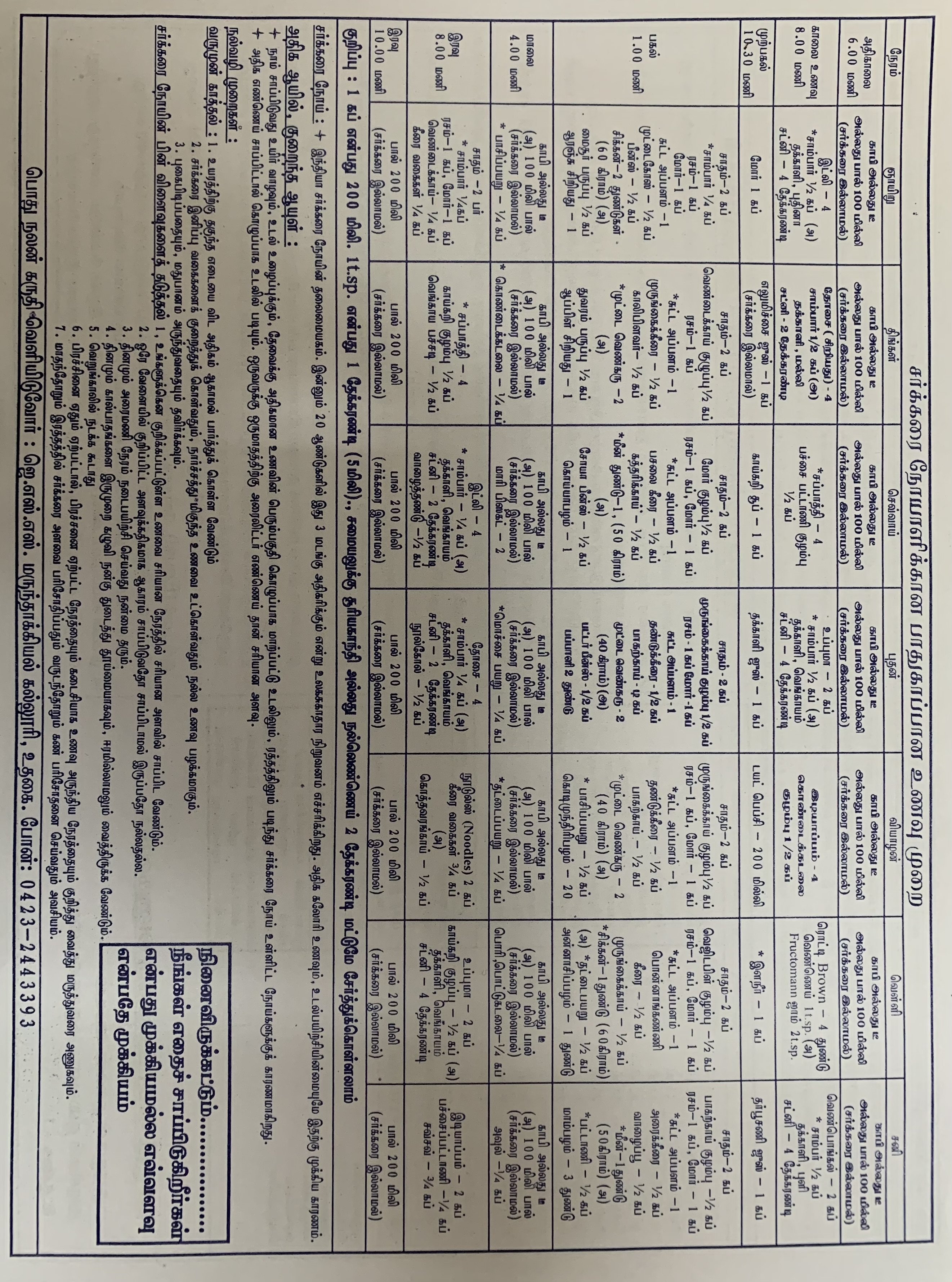
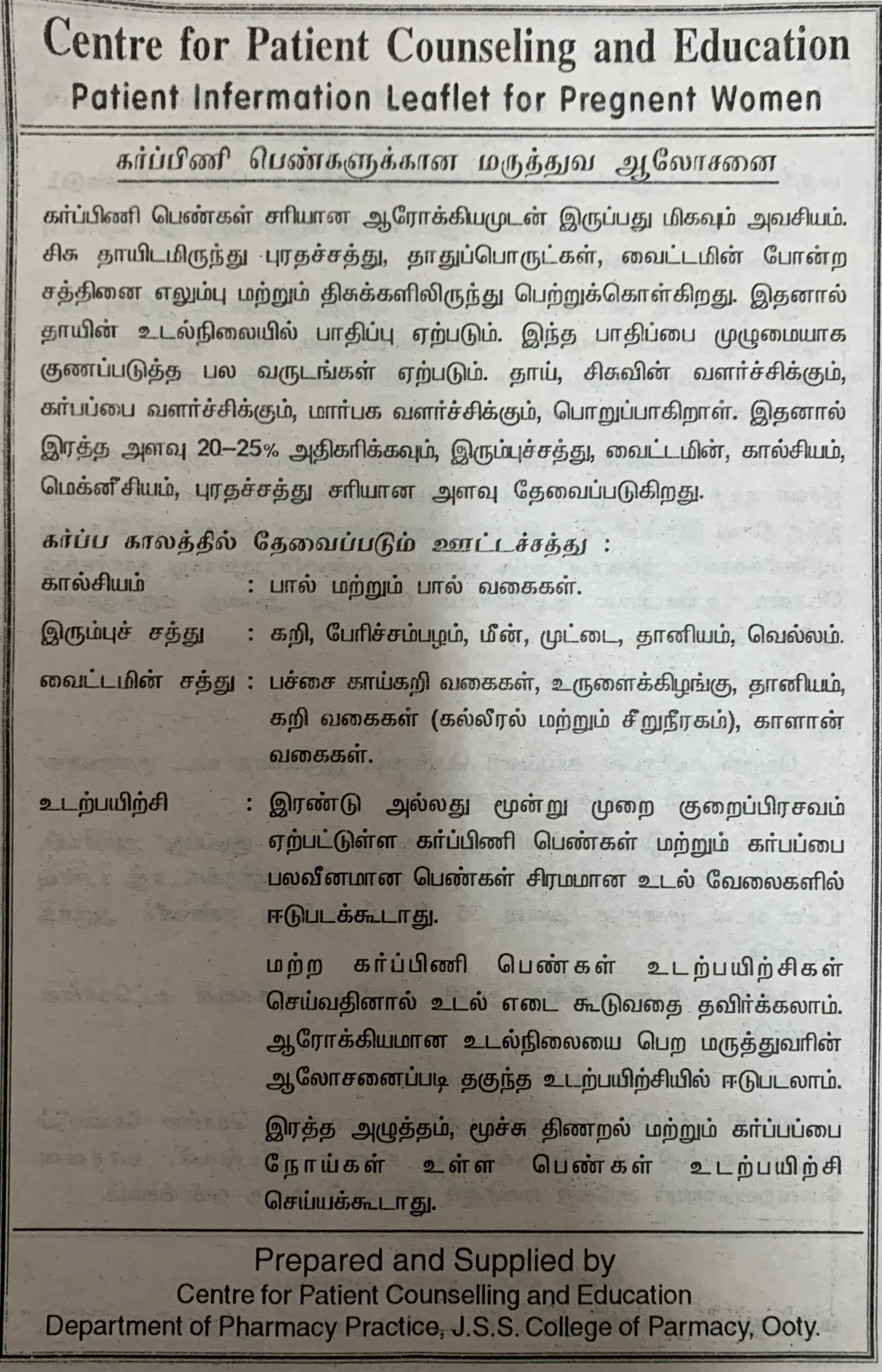
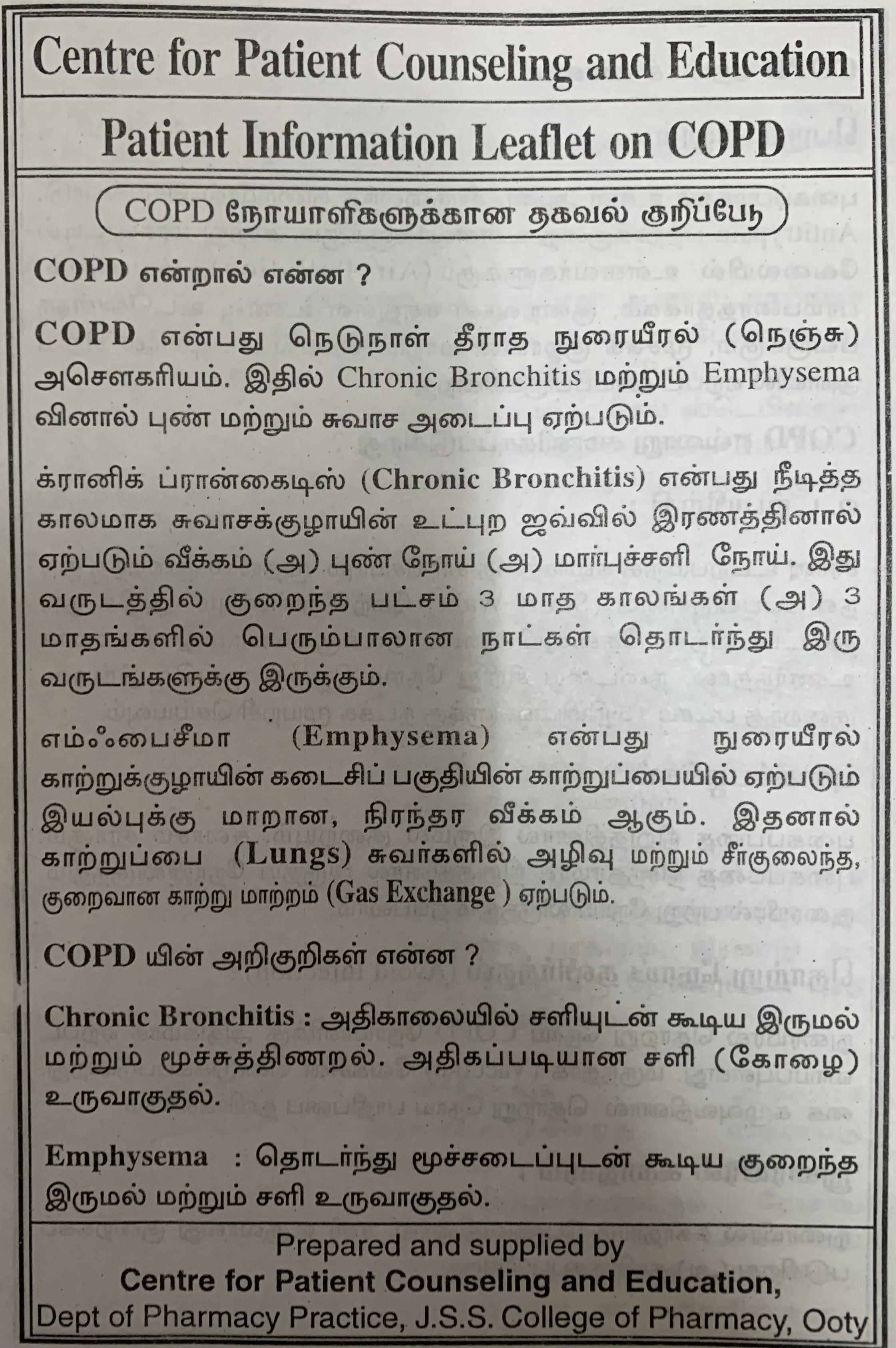
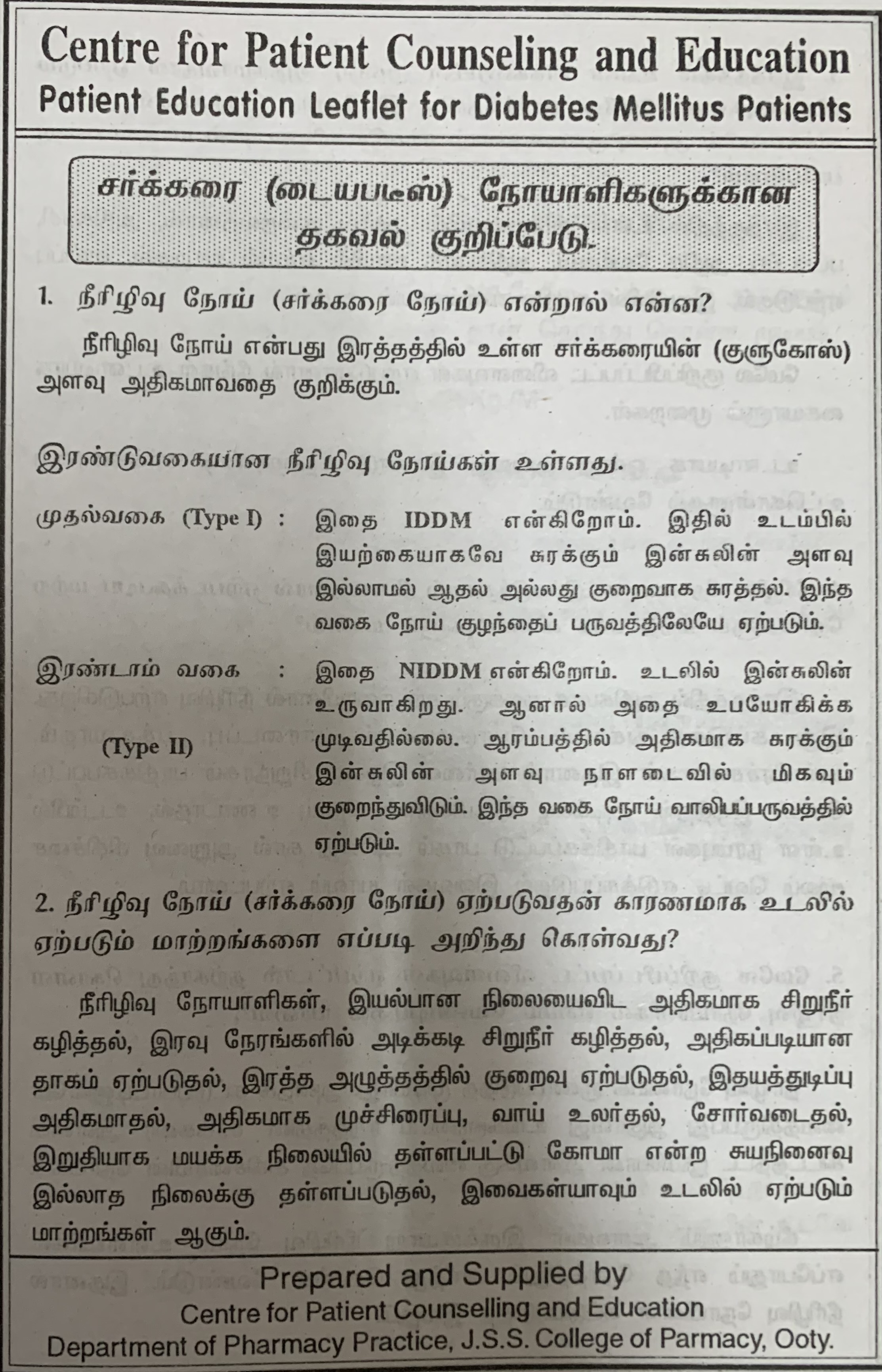
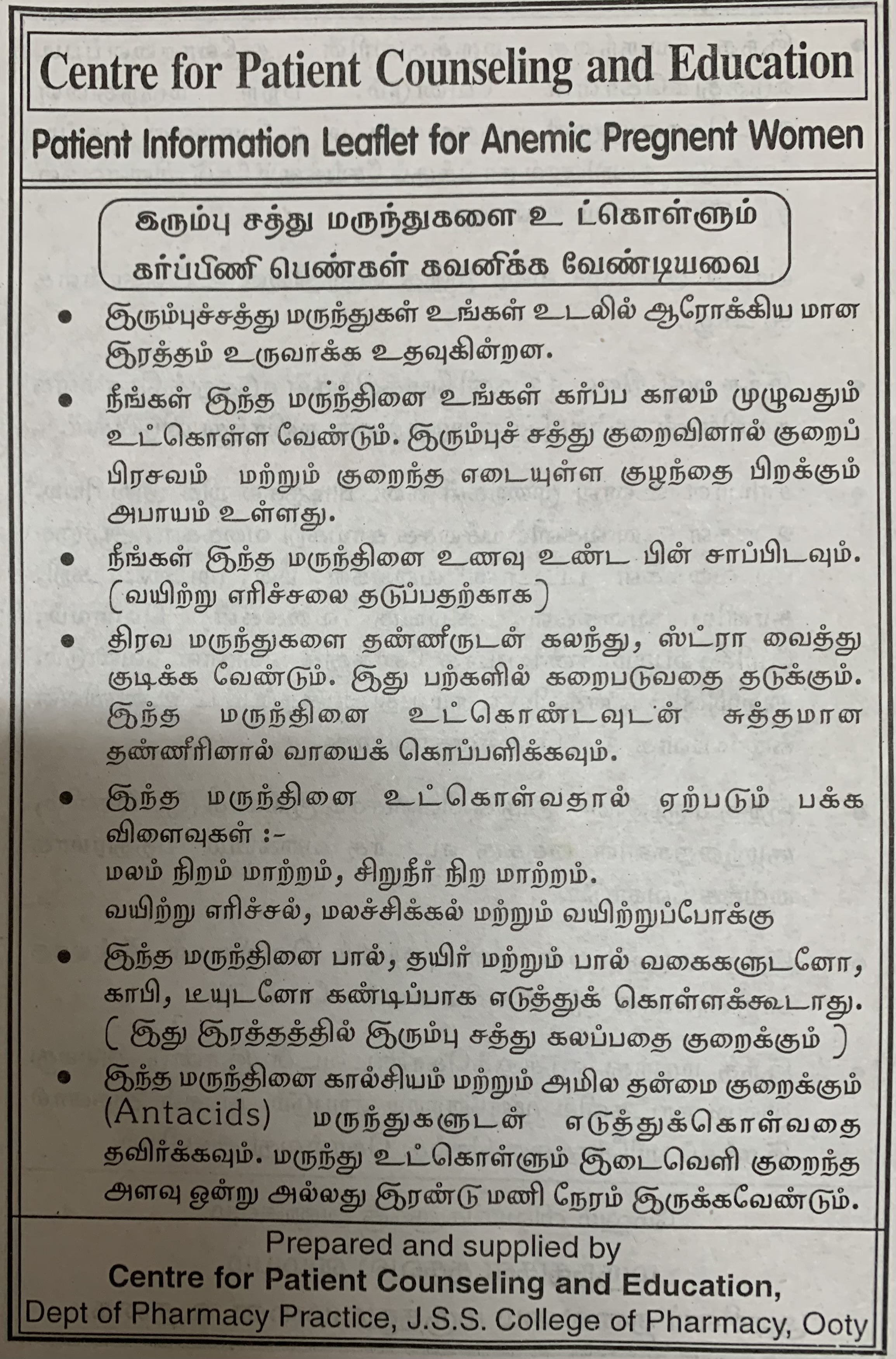
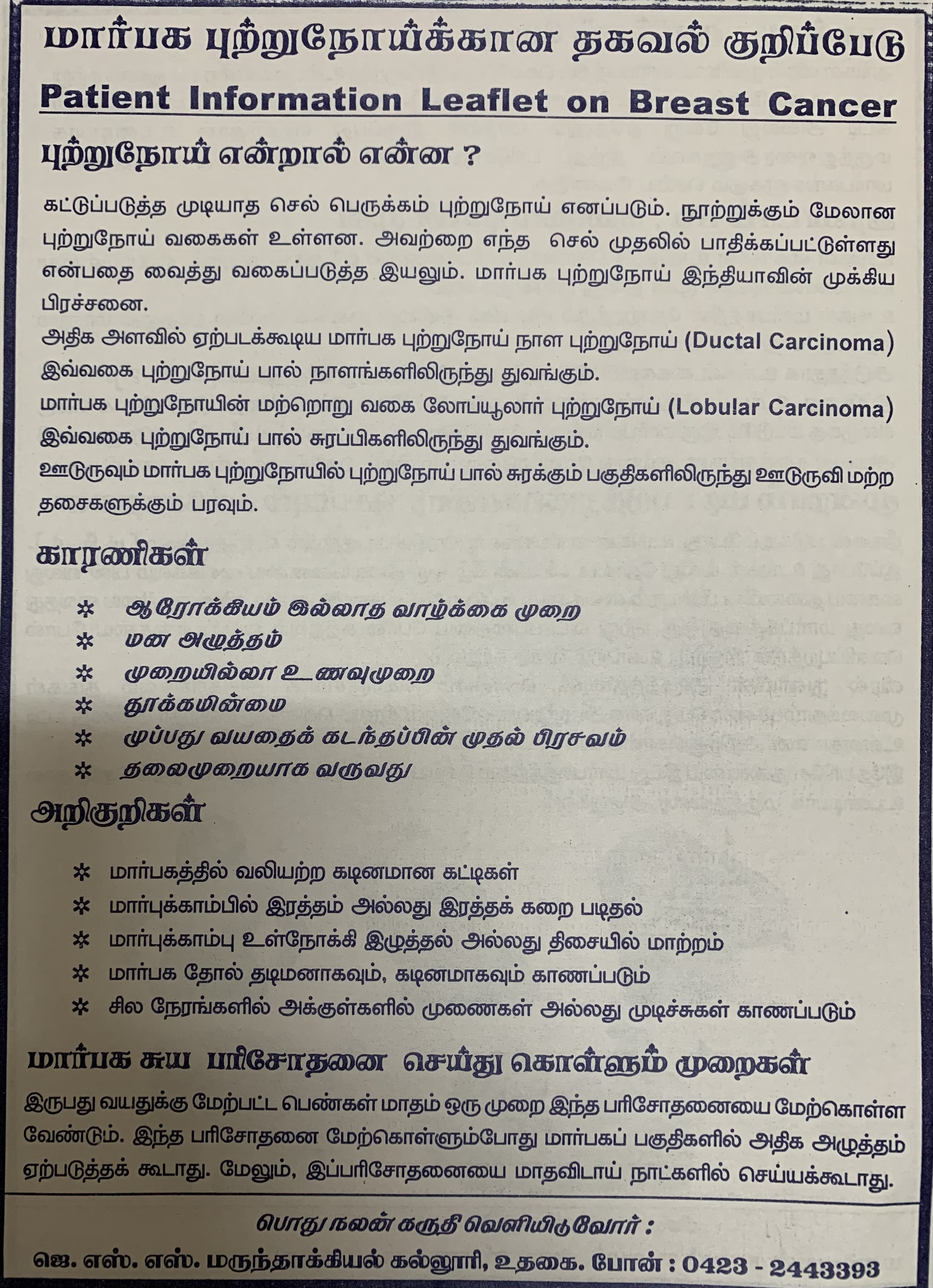
Pharmaceutical Care Policy
The purpose of the Pharmaceutical care policy document is to describe the standardized methods to foster consistency and continuous provision of pharmaceutical care services within the purview of the healthcare system in the hospital settings. This policy document shall also facilitate to generate documentations and their critical analysis and sharing vital results among health care professionals to improve patient care. In-depth understanding must precede the efforts to implement pharmaceutical care, which merits the highest priority in all health care practice settings.
Department of Pharmacy Practice, JSS College of Pharmacy, Ooty is committed to move forward in Pharmaceutical Care Services with standardized policies and procedures in the contemporary pharmacy practice settings and to assist/guide health care professionals to deliver such standards of care in a patient focused, interdisciplinary practice environment.
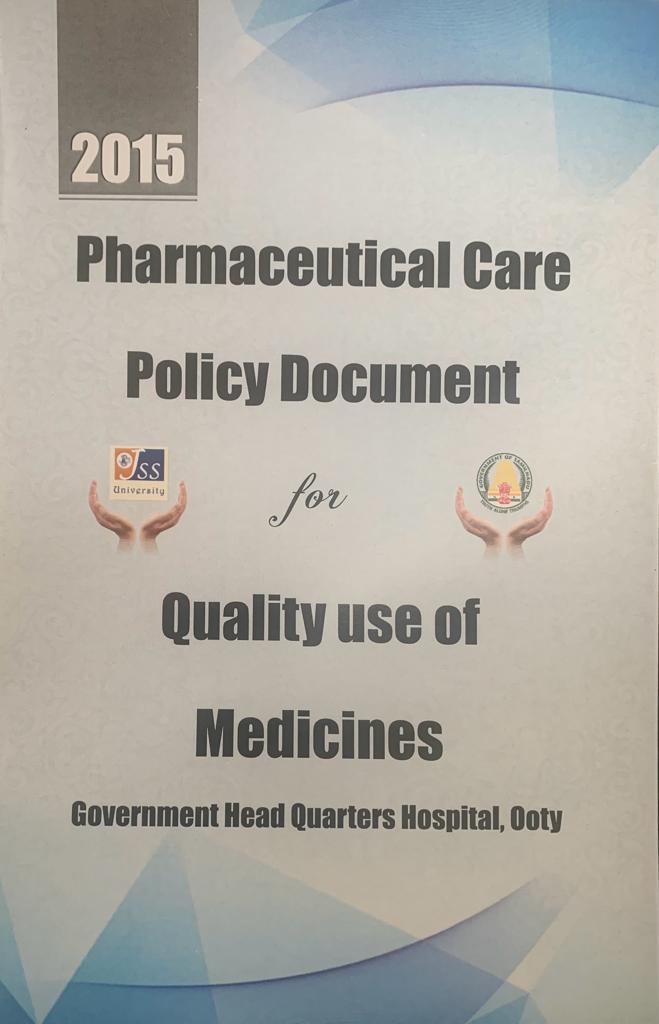
Pharmacy Practice Experimental Education
Students of Department of Pharmacy Practice are involved in patient counselling and education. Both In-patient and Out-patient Counselling services are provided to patients visiting Government Medical College & Hospital, Ooty and other Practice sites.
In order to enhance patient understanding towards the drugs and medical devices (Eg: Inhalers, Rota-halers, Insulin injections, Glucometer handling) Pictograms for patient counselling have been developed from Department of Pharmacy Practice. Pictograms are not-only useful for the patients but also useful for the students because they provide accurate and unbiased information.
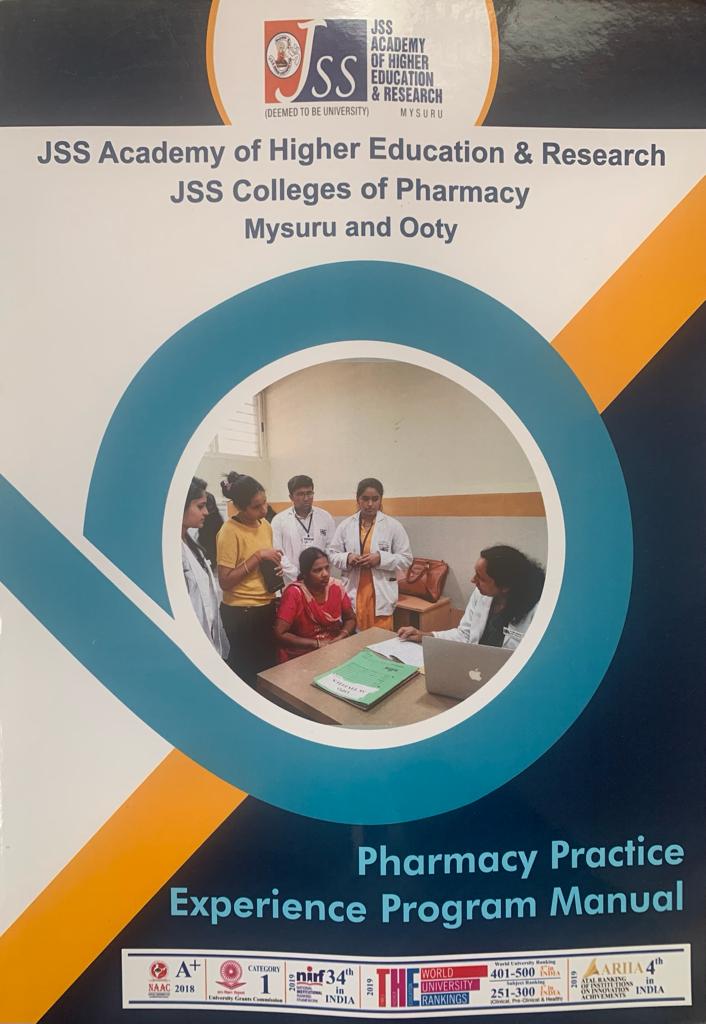
Practice experience or experiential courses are a part of Pharm D curriculum and are given from the second year to the sixth year. Two levels of practice experiences are offered to the students. They are (1) Introductory Pharmacy Practice Experience (IPPE), offered to students of second, third, fourth and fifth year of Pharm. D program, and (2) Advanced Pharmacy Practice Experience (APPE) offered to the sixth-year students. Experiential courses unlike the regular didactic classes (lectures or laboratory work), motivate the students for self-directed learning. These exercises give frontage to students about the practice concepts. During this phase, a student is exposed to the Hospital, Community and Clinical Pharmacy services in simulated environment and develops skills under the supervision of the tutor. During 6" year, the student is expected to be able to provide the services independently. In the self-directed learning environment, students have more control over their learning pace. Objectives of each experiential activity are outlined in this manual and expected competencies for each of the activities are assessed using evaluation criteria. This IPPE manual will guide the student through the introductory practice experiences.
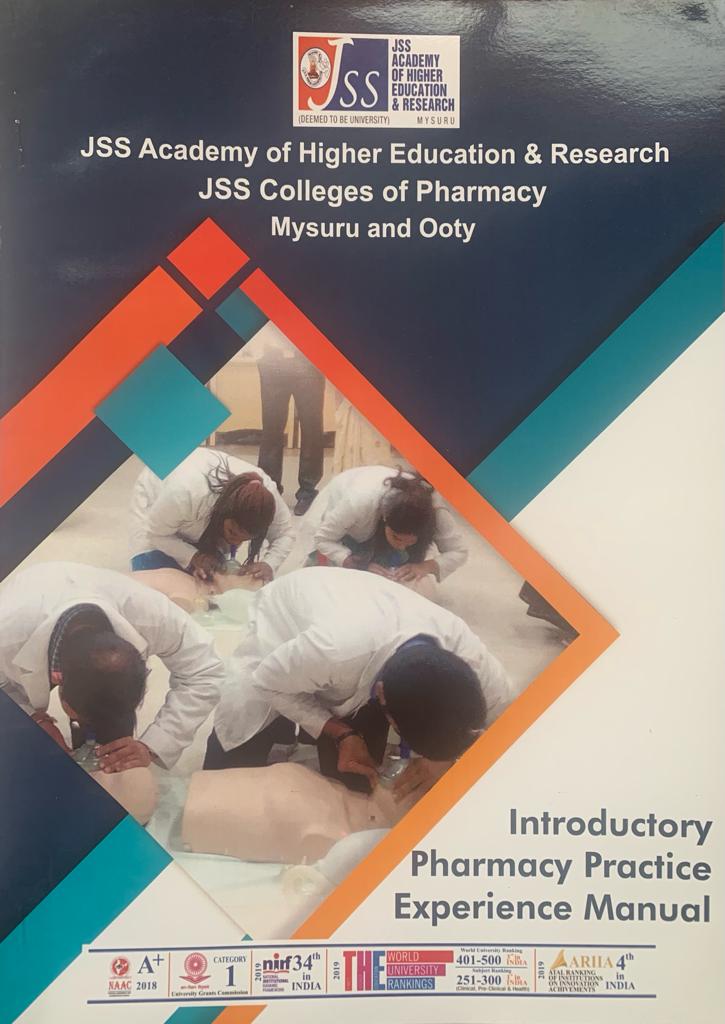
Clerkship
Students may be asked to present the allotted medical cases followed by discussion. Students’ capabilities in delivering clinical pharmacy services, pharmaceutical care planning and knowledge of therapeutics shall be assessed.
Internship
It is a phase of training wherein a student is exposed to actual pharmacy practice or clinical pharmacy services and acquires skills under supervision so that he or she may become capable of functioning independently. Internship includes posting in specialty units. Student should independently provide clinical pharmacy services to the allotted wards. The training includes posting for six months in Internal Medicine Wards & two months each in any three other specialty departments as prescribed by the Pharmacy Council of India (PCI). Interns should follow at least minimum of eight cases per week right from the day of patients' admission till discharge.
Pharmacy Practice Experience Program facilitates effective learning through well-structured and mentored educational activities. The experiential component of this curriculum is designed in such a manner that it provides in-depth exposure to curriculum and creates active participation of students in selected pharmacy practice settings. Students are exposed to prescription processing, compounding, documenting services, obtaining drug histories, drug therapy monitoring, patient counselling, evaluating drug usage, drug distribution systems, and other relevant pharmacy practice activities. Students also experience the community pharmacy practice in second year (3hrs/week or 50hrs/Year), clinical pharmacy practice 3hrs/week or 50hrs/Year) and hospital pharmacy 3hrs/week or 50hrs/Year) activities during fourth year of PharmD program. Also, in second, third and fourth year of PharmD program/curriculum pharmacotherapeutic studies are provided with opportunities to learn therapeutics (clinical uses of drugs) through the real life situation and also through case-based learning (practical of therapeutics second, third and fourth year of PharmD program). In addition, students are introduced to clinical practice experience (Clerkship) during the fifth year of curriculum (20hrs/week or 600hrs/year). Such exposure to the students at various level of their course work from second year through fourth year PharmD is expected to provide them with enough basic knowledge and training of community and hospital pharmacy and clinical practice and prepares them for advanced practice experience in the sixth year PharmD. Also, students become familiar with the functioning of healthcare set-up and learn to work as partners with patients, physicians, nurses, and other healthcare professionals and it prepares them for advanced practice experiences (internship) in sixth year of PharmD program.
The internship training in the final year (VI PharmD) of the course provides a variety of clinical settings, which provides an opportunity to learn about patient care and disease states and also to deliver pharmaceutical care services. Internship training includes mandatory postings of six months in internal medicine department and two months posting in any three other specialty departments such as paediatrics, surgery, gynaecology and obstetrics, psychiatry, dermatology, and orthopaedics.
The objective of pharmacy practice experience program is to create and facilitate the actual professional life experience in practice settings so that interns obtain an opportunity to integrate and apply their knowledge based on the knowledge and experience of various phases of curriculum. Pharmacy practice experience program helps them develop critical thinking skill and use it in the actual practice of pharmacy, thereby playing a key role in patient care. It also cultivates the qualities of professionalism in inters/student pharmacist and makes the intern practice more independently in variety of clinical settings. Overall, the pharmacy practice experience program produce a well-rounded, competent, caring, and responsible professional who can deliver exemplary pharmaceutical care and communicate effectively with diverse patient population, health care professionals and colleagues.
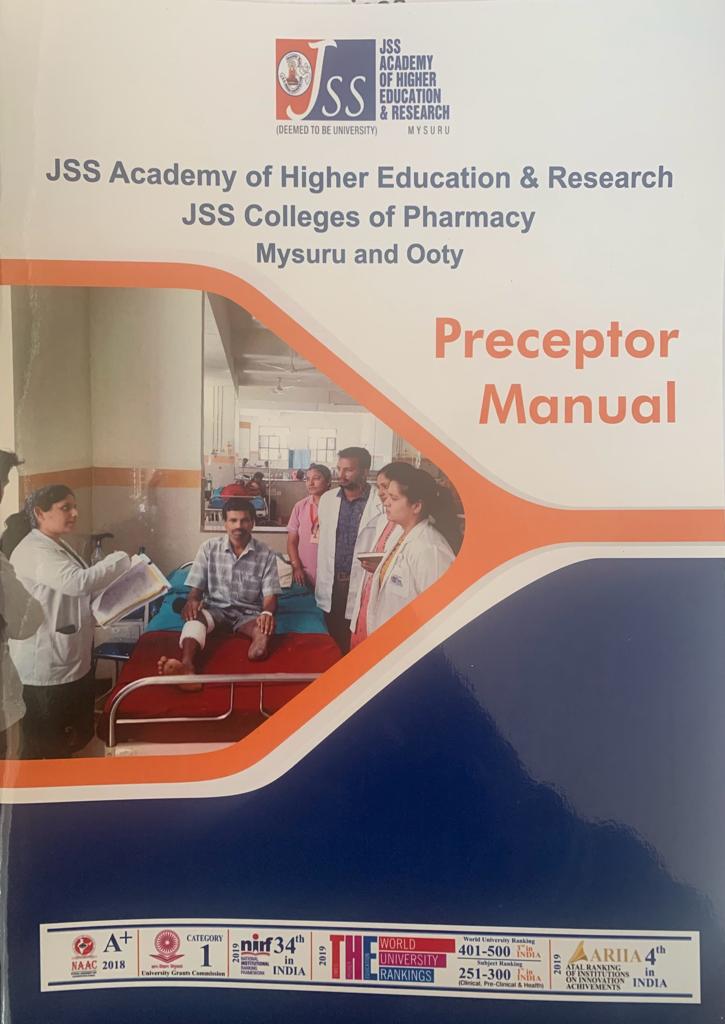
Medicine Management
Medicine management is defined by UK’s Medicines and Healthcare Products Regulatory Agency (MHRA) as “The clinical, cost-effective and safe use of medicines to ensure patients get the maximum benefit from the medicines they need, while at the same time minimizing potential harm.”
Medicines Management is a system of processes and behaviors that determines the way that medicines are used by patients. Getting medicine use “right” has the potential to not only improve patient outcomes but also contribute to patient safety.
Medicine Management Symposium on Infectious Disease
Date: 3rd & 4th November 2023 | Venue: Auditorium, JSS College of Pharmacy, Ooty
Speakers:
Dr. GRACE MARY JOHN, Pharm D, BCIDP, Infectious Disease Clinical Pharmacist, Believers Church Medical College Hospital (BCMCH), Thiruvalla, Kerala.
Dr. LINDA JACOB, Pharm D, Clinical Pharmacist Coordinator, Believers Church Medical College Hospital (BCMCH), Thiruvalla, Kerala.
Dr. SHERIN MARY SHAJI, Pharm D, Clinical Pharmacist, Believers Church Medical College Hospital (BCMCH), Thiruvalla, Kerala.
The Medicine Management Symposium on Infectious Disease, held on 3rd & 4th November 2023 at JSS College of Pharmacy, Ooty, served as a comprehensive platform for healthcare professionals to delve into the dynamic intersection of medicine and management in the context of infectious diseases. The participants for the symposium were IV, V and VI year Pharm D students and Research Scholars of JSS College of Pharmacy, Ooty. The total number of participants was around 90 members. The event was segregated into 6 Lectures on day 1 and 5 Lectures on day 2. In each lectures the speakers shared their valuable insights about antimicrobial agents, Pneumonia, Antimicrobial stewardship, Lower Respiratory Tract Infections, Urinary Tract Infection, Antimicrobial Usage in Urinary Tract Infections, Pharmacokinetics and Pharmacodynamics of antibiotics, Spontaneous Bacterial Peritonitis, Intra-abdominal infections (IAIs) and Skin and soft tissue infection.
The symposium aimed to foster collaboration, share insights, and explore innovative approaches to enhance patient care. Discussions included pharmacokinetics, novel drug developments, and strategies for optimizing medication regimens to improve patient outcomes. The symposium emphasized the pivotal role of pharmacists in interdisciplinary healthcare teams. A significant focus was placed on antimicrobial stewardship programs, addressing the critical need for responsible antimicrobial use. Participants engaged in discussions on combating antimicrobial resistance and implementing effective stewardship practices in healthcare institutions. Real-world case studies provided a practical dimension to the symposium. Participants analyzed and discussed cases that illustrated challenges faced in clinical practice, allowing for a deeper understanding of the complexities of infectious disease management.
Discussions centered on the challenges inherent in infectious disease management. Strategies to address medication adherence, overcome resistance, and ensure optimal patient outcomes were explored, fostering a proactive approach to healthcare challenges. The Medicine Management Symposium on Infectious Disease proved to be a vital forum for knowledge exchange and professional networking. The diverse range of topics covered, from pharmaceutical interventions to integrated healthcare practices, will undoubtedly contribute to advancing the field of infectious disease management. The speakers clarified the queries enquired by the audience and staff, Department of Pharmacy Practice. At the end of the event, the speakers were honored by Dr. Dhanabal, Principal, JSS College of Pharmacy and the certificates were distributed to the participants. Around 90 participants fruitfully benefited through this symposium.
Coordinated by:
Dr Sivasankaran Ponnusankar
Professor & Head
Department of Pharmacy Practice
JSS College of Pharmacy, Ooty.
Continuing Pharmacotherapy Education (CPhE)
Continuing Pharmacotherapy Education (CPhE) is an opportunity to the Pharm D and M Pharm (Pharmacy Practice) students to establish the better understanding of pharmacotherapy and strong clinical base to serve as clinical pharmacist in diverse patient care settings. Further, our students will have an opportunity to gain additional knowledge of the practice standards followed by the specialty consultants practicing in higher treatment centers.
Medicines Management is a system of processes and behaviors that determines the way that medicines are used by patients. Getting medicine use “right” has the potential to not only improve patient outcomes but also contribute to patient safety.
The benefits of organizing the CPhE for our students includes:
- Develop pharmacotherapy skills and initiate discussion on the selected topics for better understanding
- Development of patient care skills – based on pharmacotherapy decision
- Understanding the expectations of Consultants / Clinicians from Pharm D graduates
- Create an opportunity for our students to interact with the consultants
- Developing an network with the hospitals through the consultants for the purpose of creating job opportunities for our students
-
Lecture 3: Therapeutic Medical Devices in Cardia Surgery - 22-02-2024
-
Lecture 2: Liposomal Methotrexate in the Treatment of Psoriasis - 19-12-2023
-
Lecture 1: Basic Life Support (BLS) training – Effective management of cardiac and respiratory patients- 27-09-2023
